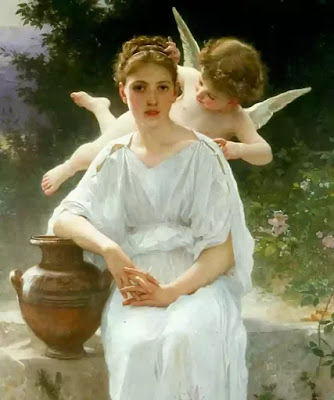Also Read
The Angel
Summary and Analysis
Introduction:
Blake's illustration of this poem The Angle represents a young queen, attended by a winged Cupid. the God of Love, who seeks in vain to attract her, attention away from her evident propriety. The poem is evidently a woman's regret over missed chances and a wasted life. Deterred by the rigid code of virginity, she does not welcome love though, inwardly, she cannot check herself from feeling it. Her fearful attitude towards love debilitates her and deprives her of her golden chances of union with her lover.
 |
| The Angel |
Summary:
The dreamer who is a maiden says that when love in the person of an angel came to her she felt she was a maiden queen. But her sense of conventional regulations and codes of morality hindered her and she could not disclose her feelings to her lover. She was in fact delighted at his arrival but was unable to express it. As a result, the angel fled away. But the maiden was not happy. She, however, chose to defend herself against her feelings and hardened her heart. Ultimately she became too old to respond to love-thus her love came in vain.
Conventional Morality:
It is the conventional morality that works as an obstacle in the maiden's way of her enjoyment of her own passions. Sex, as D.H. Lawrence says, "is a king in exile". Unlike in Songs of Innocence the protagonist's mind here expresses overwhelming fear. In experience the codes of social ethics and etiquette lay their hands on the individuality of man and curb some aspects of the human personality. Blake seems to support the view that sex is not sinful; instead, it is a factor that unites two beings and functions as the culmination of love. In 'Innocence', nakedness is a symbol of uncorrupted innocence. In 'Experience' the mind or rather the brain predominated and overpowers the free instincts. It is the maiden's reserve and her tendency to preserve herself with arms that makes her life unfulfilled. Her highly reserved nature also frustrates the angel of love.
Confessional Note in the Poem:
The poem 'The Angel' reflects the sad note of repentance in the words of the maiden. Her coyness and abstinence help her only to miss the chance of union with her lover. She puts up a defence against expression of her instincts. The consequence is nothing but his withdrawal from her. She pretends to be afraid of him, and thwarts his advances. When he approaches her again, her hair has gone gray and she is a hag and it is too late. She puts all her story in a mood of confession, and in this sense the poem has a pathetic note.
Blake's Attitude Towards Love:
Wolf Mankowitz substantiates Blake's attitude towards love when he says: "Love in its social definition is a negative creed of secretive joyless forbidding; love in Blake's experience is a vital matter of joy, open and sensuous. This insistence upon the need to keep sex open and honest and not a 'dirty sore', is incidentally, just one of the points at which Blake reminds me of D.H. Lawrence". The speaker of the poem is a queen, but a maiden Queen, and the Angel is, of course, mild as an angel should be. But immediately the maiden begins to resent the presence of the angel:
"I wept both day and night
And hid trom him my heart's delight."
The hidden heart's delight is both the pleasure which the girl feels but feels constrained to hide and the delight which she is capable of experiencing with the angel. Blake uses the word 'angel' in the context of sexual experience. The maiden is prey to the worm that flies in the night, and to the briars in the Garden of Love. She is constrained by the Night which enchains the Earth. Her angel "took his wings and fled", and she "armed (her) fears with ten thousand shields and spears". Entrenched behind her fear of the experience which the angel represented, she successfully repulses any further advances he may make until 'the time of Youth was fled.' Obviously the angel in this very familiar case history is no angel so far as the 'clod' is concerned. The Clod might even consider him diabolical for he does not mention marriage. But to Blake he is an Angel-an instrument of creative purpose. The virtue which the maiden Queen exhibits would be socially classified as modesty. She is very like the modest rose in the poem 'Lily'.